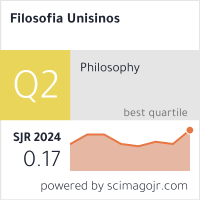The final end of imagination: On the relationship between moral ideal and reflectivity in Immanuel Kant’s Critique of the Power of Judgment
DOI:
https://doi.org/10.4013/fsu.2017.182.05Resumen
One main quandary that emerges in the context of Immanuel Kant’s moral ideal, The Highest Good, is that on the one hand Kant sets it as a moral demand, that is, as a principle that must be comprehended as an attainable end for man in practice while, on the other hand, it is set as a moral ideal, i.e. as something that cannot be concretized and realized within the empirical world. The main goal of this paper is to argue for the realizability of the moral ideal by means of the principle of reflective judgment as a form of judgment that in fact clarifies human limitation. I assert that the very recognition of this limitation constitutes the possibility for hope in that ideal, or for striving towards it, and that this striving is the only way that the moral ideal can be concretized. I examine man’s recognition of self-limitation as a response to the moral demand to realize the moral ideal and the necessity of the power of imagination for this, used reflectively.
Keywords: culture, final end, Highest Good, hope, imagination, Kant, moral ideal reflective judgment, ultimate end.
Descargas
Descargas
Publicado
Cómo citar
Número
Sección
Licencia
Concedo a revista Filosofia Unisinos – Unisinos Journal of Philosophy o direito de primeira publicação da versão revisada do meu artigo, licenciado sob a Licença Creative Commons Attribution 4.0 (que permite o compartilhamento do trabalho com reconhecimento da autoria e publicação inicial nesta revista).
Afirmo ainda que meu artigo não está sendo submetido a outra publicação e não foi publicado na íntegra em outro periódico e assumo total responsabilidade por sua originalidade, podendo incidir sobre mim eventuais encargos decorrentes de reivindicação, por parte de terceiros, em relação à autoria do mesmo.










